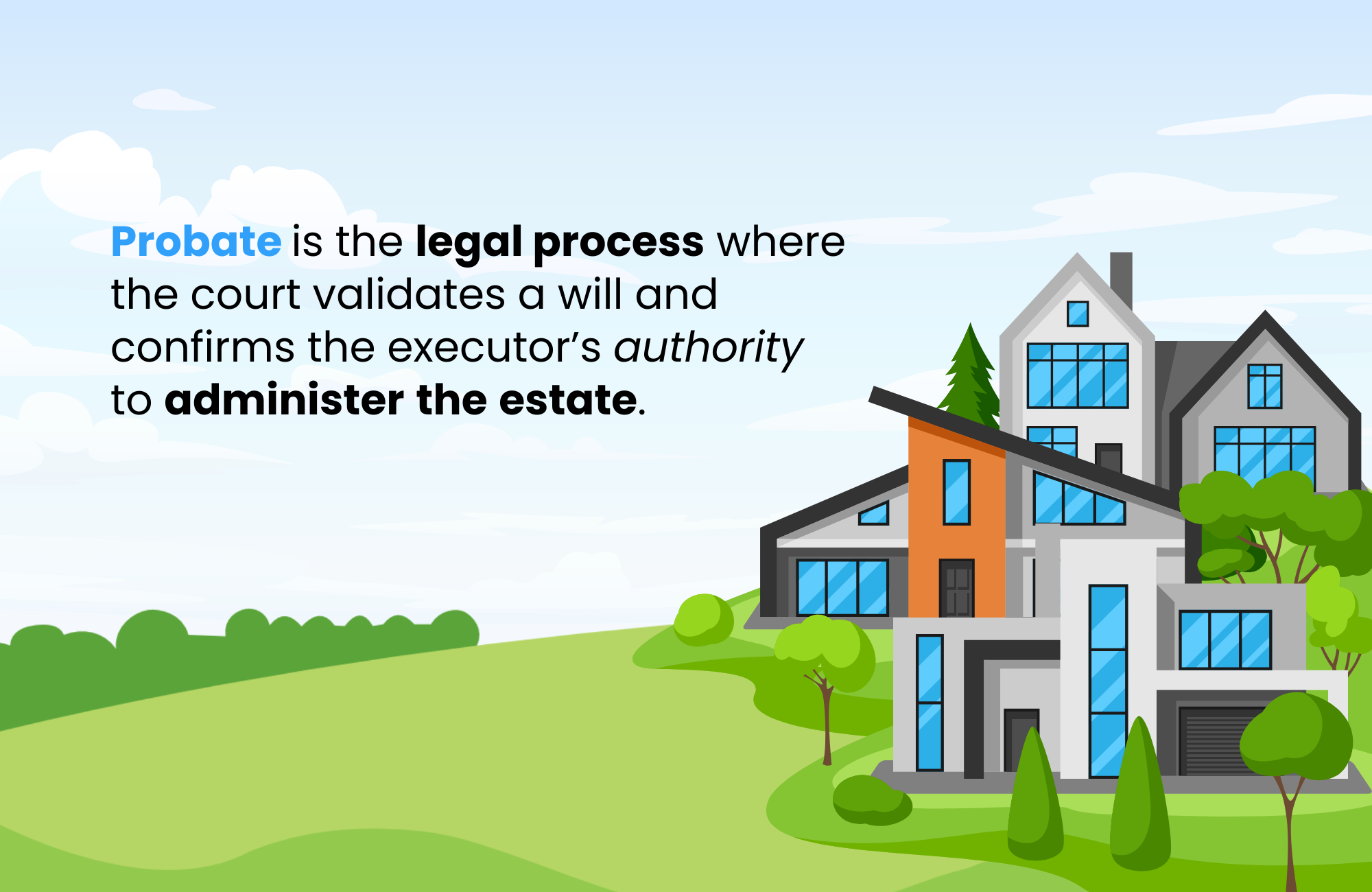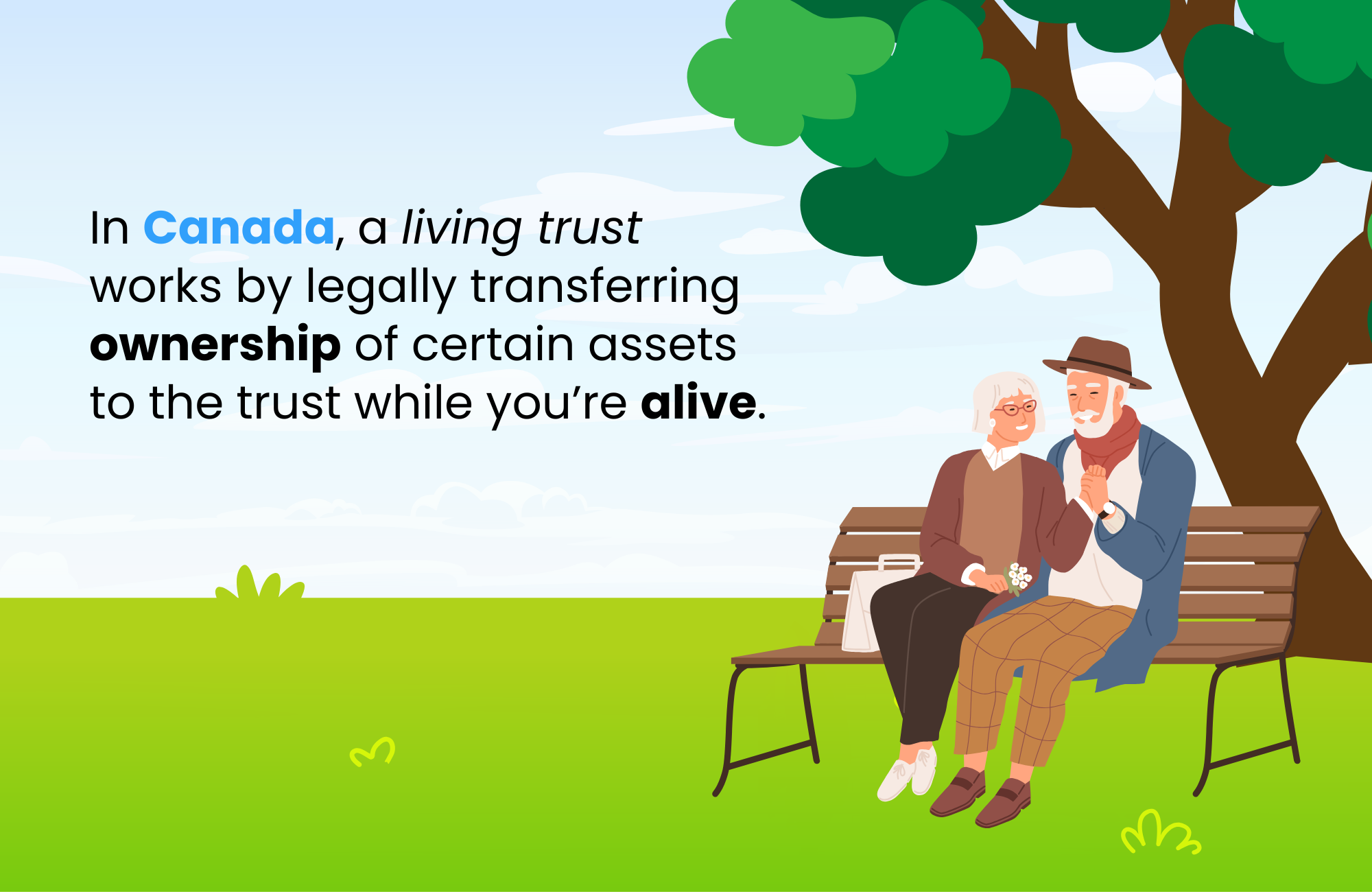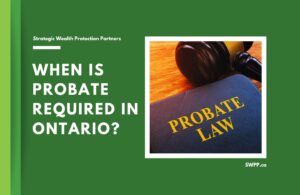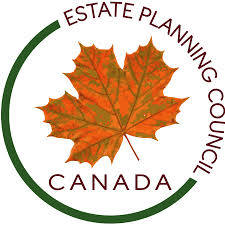Written by Ron Cooke, President & Founder of Strategic Wealth Protection Partners in Ontario, CEA®, Member of the Estate Planning Council Canada
Do Living Trusts Go Through Probate?
Do living trusts go through the probate process in Canada? Living trusts generally do not go through probate in Canada.
That’s one of their biggest advantages—because assets inside the trust are no longer legally owned by you at death, they avoid the probate process entirely. This means your loved ones can receive assets faster, privately, and without triggering Ontario’s estate administration tax.
It’s a strategy that brings both emotional peace and financial clarity. But it only works if the trust is properly structured and funded.

Key Takeaways
- A living trust lets you keep control while you’re alive, but pass assets outside of the probate process after death.
- Revocable living trusts allow flexibility but don’t provide creditor protection or tax benefits.
- Irrevocable trusts offer asset protection and tax planning benefits but require giving up control.
- Only testamentary trusts, created through a will, are subject to probate.
- Trusts can reduce delays, maintain privacy, and bypass Ontario’s estate administration tax if funded correctly.
What Is Probate in Canada?
Probate is the legal process where the court validates a will and confirms the executor’s authority to administer the estate.
In Ontario, it often involves paying estate administration tax, based on the value of the assets going through probate. Without probate, assets can’t typically be legally transferred to heirs—unless they’re in a trust or designated through other planning tools.
Probate is public, sometimes slow, and can become costly depending on the size of the estate. That’s why many families plan ahead to avoid it.

What Is a Living Trust?
A living trust is also called an inter vivos trust.
A living trust is a legal arrangement created while you’re alive to manage assets during your life and distribute them after your death—without going through probate.
It holds ownership of your chosen assets, but you can still benefit from and control those assets if it’s a revocable trust. Living trusts are private, flexible, and especially useful if you want to keep your estate out of court. They must be funded properly to be effective. (+)

How Does a Living Trust Work in Canada?
In Canada, a living trust works by legally transferring ownership of certain assets to the trust while you’re alive.
You can serve as your own trustee and manage everything day to day. If you become incapacitated, your successor trustee steps in. Upon death, the trust doesn’t go through probate—your trustee simply follows the trust terms and distributes everything directly. It’s a smooth, quiet process if set up and maintained properly.
Do Living Trusts Ever Go Through Probate in Canada?
A properly funded living trust should not go through probate.
However, if any assets were not retitled into the trust—like real estate or bank accounts—those assets might still require probate. The trust would function for what it holds, but anything left outside would fall back into probate. That’s why funding the trust properly is critical—creating the trust isn’t enough.
Pros and Cons of Using a Living Trust to Avoid Probate
Pros:
- Avoids probate and estate administration tax on trust-held assets
- Provides privacy—unlike wills, trusts aren’t public
- Helps manage incapacity with a named successor trustee
Cons:
- Requires setup and legal fees
- No tax benefit with a revocable trust
- Must be maintained and updated with life changes
Is Avoiding Probate Worth the Cost of a Living Trust in Canada?
In many cases, yes—especially if you own real estate, have a blended family, or want to keep your affairs private.
Avoiding Ontario’s probate delays and fees can be worth the upfront time and cost. However, the benefits depend on your estate size and goals. For some, a combination of a will and a trust offers the best approach.
📖 Related Read: What Is the Cost of Setting Up a Living Trust in Canada?

Revocable and Irrevocable Living Trusts
Living trusts fall into two broad categories, each with different implications for control, tax, and protection.
| Feature | Revocable Living Trust | Irrevocable Living Trust |
|---|---|---|
| Control | Full control retained by settlor | Control is surrendered; cannot be changed |
| Ownership | Assets effectively still under settlor’s control | Assets permanently owned by the trust |
| Tax Treatment | Income taxed to settlor | Trust taxed at highest marginal rate (unless exception) |
| Creditor Protection | Limited or none | Strong protection from creditors |
| Probate Avoidance | Yes, if assets are properly transferred | Yes, if properly structured and funded |
| Estate Admin Tax (Ontario) | Avoided for assets inside trust | Avoided for trust-held assets |
| Privacy | High — terms remain private | High — not subject to court filing |
| Use Case | Control and flexibility; managing incapacity | Tax efficiency, wealth preservation, protection for heirs |
| Cost & Complexity | Moderate | Higher complexity and cost |
What Assets Can Be Placed in a Living Trust?
Many types of assets can be included in a Canadian living trust, including:
- Real estate (especially second homes or rental properties)
- Investment accounts (non-registered)
- Private business shares or interests
- Personal property (art, jewelry, collectibles)
However, registered accounts like RRSPs, TFSAs, and RRIFs usually cannot be transferred during your lifetime without tax consequences. These should be handled using beneficiary designations.
What Happens to a Living Trust After Death?
After the settlor’s death, the successor trustee takes over and begins administering the trust according to its terms.
No court involvement is required. The trustee handles debts, taxes, and distributions to beneficiaries. This is usually faster and more private than the probate process.
Tax and Legal Considerations for Canadian Living Trusts
- Revocable trusts don’t offer income tax savings in most cases.
- Irrevocable trusts can support tax planning, income splitting, or sheltering future growth.
- Trusts are generally taxed at the highest marginal rate, unless they qualify for special treatment.
Canada’s new trust reporting rules impose strict filing requirements. - Professional guidance is essential to ensure compliance and optimize outcomes.
How to Set Up a Living Trust in Canada
- Decide between revocable or irrevocable trust based on your goals
- Choose a trustee, and name a backup
- Draft the trust document with a qualified professional
- Transfer ownership of assets into the trust
- Maintain the trust—review and update it as needed
Without transferring assets, even the best-drafted trust won’t avoid probate.

Common Questions about Living Trusts and Probate
What is the difference between a trust and a living trust?
A trust is a legal structure for managing assets, which can be created during life or after death. A living trust is created while you’re alive and is designed to avoid probate.
What is the best type of trust to avoid probate?
A revocable living trust is often the best option to avoid probate in Ontario if you want to maintain control. An irrevocable trust also avoids probate but involves giving up control.
What is a successor trustee?
A successor trustee is the person named to manage the trust if you become incapacitated or pass away. They take over the administration and distribution of trust assets.
Can a living trust help if I become incapacitated?
Yes, a living trust lets your chosen trustee step in and manage your finances without needing court approval. It helps you maintain dignity and continuity if you’re unable to make decisions.
What is the biggest mistake people make when setting up a trust?
The most common mistake is creating a trust but not transferring assets into it. An unfunded trust doesn’t avoid probate or fulfill its intended purpose.
Is a living trust worth it?
For many families, yes—especially if privacy, avoiding probate, or planning for incapacity are priorities. But it must be set up thoughtfully and tailored to your unique estate.
Discover the Benefits of a Living Trust in Ontario
Are you an Ontario resident considering a living trust as part of your estate planning?
At Strategic Wealth Protection Partners, we’re here to guide you through every step of the process with expert advice and personalized support. Begin your estate planning journey today with a Living Estate Plan Consultation from our experienced team.
Our mission at SWPP is to help you create an estate plan that secures your legacy, shields your assets from unnecessary taxation, and ensures your loved ones are cared for. By designing a living trust tailored to your goals, our experts will help you build a plan that truly reflects your values and priorities.
Take control of your future—start planning today!
Schedule a Living Estate Plan Consultation
Planning your legacy is about more than numbers—it’s about ensuring your family remembers you and your values are honoured for many years to come.
Estate planning and trusts can feel overwhelming, especially if it’s your first time. That’s why we’re here.
With our simple, 5-Step Living Estate Plan, we make the process easy, helping you create a comprehensive estate plan or trust that protects your assets from taxes and probate fees while preserving your legacy. Tools like The Final Word Journal capture your story, wishes, and essential details like accounts and end-of-life plans, ensuring your family has clarity and comfort.
Take the first step today—schedule a consultation call and give your family the ultimate gift: peace of mind and the assurance they were always your priority.
Read More
If you’re starting your estate planning process, you may find these articles helpful:
- Living Trust Ontario Guide: What It Is & Do You Need One?
- What Are the Disadvantages of a Living Trust in Ontario?
- Can I Put My House in a Living Trust in Canada?
About the Author
RON COOKE, PRESIDENT & FOUNDER OF STRATEGIC WEALTH PROTECTION PARTNERS

With over 30 years in financial services, I’ve seen the challenges families face when a loved one passes—lost assets, unnecessary taxes, and emotional stress. That’s why I created the Living Estate Plan, a comprehensive process to protect assets, eliminate estate and probate fees, and create legacies that are remembered for many years to come.
This plan ensures your family receives not just your wealth, but a meaningful reminder of your care and love. Tools like The Final Word Journal capture your story, wishes, and essential details, offering clarity and comfort during difficult times.
Your final gift should be more than money—it should be peace of mind, cherished memories, and an organized estate.
Schedule a Call
Schedule a 30-minute consultation call with Strategic Wealth Protection Partners.
Click HERE to schedule a consultation.









